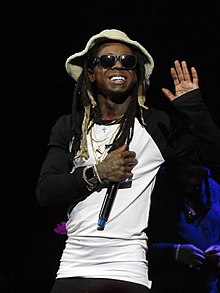Draft:Mixtape
| Submission declined on 30 October 2024 by Dan arndt (talk). Thank you for your submission, but the subject of this article already exists in Wikipedia. You can find it and improve it at Mixtape instead.
Where to get help
How to improve a draft
You can also browse Wikipedia:Featured articles and Wikipedia:Good articles to find examples of Wikipedia's best writing on topics similar to your proposed article. Improving your odds of a speedy review To improve your odds of a faster review, tag your draft with relevant WikiProject tags using the button below. This will let reviewers know a new draft has been submitted in their area of interest. For instance, if you wrote about a female astronomer, you would want to add the Biography, Astronomy, and Women scientists tags. Editor resources
|  |
In the modern music industry, a mixtape is a musical project with looser constraints than that of an album or EP.[1][2] Unlike the traditional album or extended play, mixtapes are labeled as more informal projects that allow for more creative freedom, less commercial pressure, and more emphasis on personal tone.[3] The term has significantly increased in recognition over the years, due to high-profile artists marketing their musical projects as such.[4][5] Mixtapes also have been inconsistently referred to as albums by media outlets such as Pitchfork, Rolling Stone and Complex. [6][7][8][9] This has cause notable confusion on the difference.[10]
Characteristics and Purpose
[edit]
Mixtapes are a recognized alternative to studio albums, especially in genres of hip-hop, R&B, and indie music.[11][12] They allow artists to release music without industry-level expectations expected from the likes of a concept album.
Mixtapes also give artists the ability to explore themes, styles, and sounds that may not be supported by traditional commercial projects.[13][14] Some artists may use the mixtape-format to test new sounds or take risks without the obligational weight of an album. The absence of formal promotion, industry-standard production, or chart performance makes mixtapes often feature more raw and experimental content, which may be preferable to their fans.[15]
Release and Marketing
[edit]While mixtapes used to be distributed for free, music on platforms like Spotify, Apple Music, and Soundcloud have blurred the line between what is considered a full-on album versus what is considered a mixtape.[2][16]
Artists typically distinguish an album from a mixtape in two ways:[17]
Marketing
[edit]
The marketing of a mixtape usually is minimal, spontaneous, and unorthodox.[19] In contrast, studio albums often have more professional media campaigns, music videos, and a set release. Because of a mixtape's "unpredictability" that varies from artist, mixtapes may entertain fans with excitement due to surprise releases.[15]
Digital Release and Promotion
[edit]On streaming platforms, mixtapes are nearly identical in format, as both include album art, titles, and track lists. However, mixtapes may lack the proper promotion and radio play that traditional albums offer. Artists may informally promote their mixtapes by posting to their own social media (as opposed to having a management team do it) or by directly engaging with their fans online.[13] Mixtapes are usually a more personal rollout of music.[15]
Cultural and Artistic Value
[edit]
The mixtape's role in modern music has become popular among all artists. For independent and emerging artists, mixtapes are a gateway to building a fanbase and experimenting with their sound. For established artists, mixtapes can be used as an outlet for personal expression and experimentation to escape the pressures of a record label or commercial appeal. The value of a mixtape lies in its ability to define the artist rather than an industry standard, making it an important concept in music.[21][22]
Mixtapes can also serve as a precursor to an upcoming album for artists. As an example, Travis Scott released his mixtape, Days Before Rodeo as an anticipation project for his debut album, Rodeo.[23] Another example is While We Wait by singer and songwriter Kehlani. The mixtape was released to promote the upcoming release of her album, It Was Good Until It Wasn't. Generally, mixtapes can be used as both a standalone project or an invitation to another upcoming project.[3][24]
Current trends
[edit]
Mixtapes allow artists to share their music in a lowkey setting with their fans, and likely encourage feedback and interaction from fans rather than professional critics. This idea of engagement and experimentation is often popular with artists who care more about building their fanbase rather than mainstream success.
While the traditional album might stick to one theme, mixtapes allow artists to present music that could be considered eclectic or genre-blending, challenging the expectations of conventional concept albums. For example, the debut mixtape Drunken Babble by Kali Uchis was described by GQ as "dreamy R&B vocals with tough-talk rap lyrics, DIY beats, samples and influences spanning soul, reggae, doo-wop and synth-pop."[25]
In an era of short-form content, mixtapes are valuable in that they give room to maintain relevance and adapt to the fast pace of social media. One song can blow up an artist, and mixtapes give the ability for artists to answer quickly to their recent success and ride their wave of fame.[26] Because of the flexibility that mixtapes allow, releasing them on platforms like TikTok can instantly increase an artist's mainstream recognition and reach a broader audience, and of course, without the expectations of a full album rollout.[27] As an example, R&B artist 4Batz released his debut mixtape U Made Me a St4r after the overwhelming success of "Act II: Date @ 8".
References
[edit]- ^ "Mixtape vs. Album: Unveiling the Key Differences". 2024-10-22. Retrieved 2024-10-30.
- ^ a b "What's The Difference Between A Mixtape And An Album?". Yona Marie Music. Retrieved 2024-10-30.
- ^ a b "Five Cent Sound". Five Cent Sound. 2020-10-17. Retrieved 2024-10-30.
- ^ II, C. Vernon Coleman IIC Vernon Coleman (2019-11-05). "60 of the Best Hip-Hop Mixtapes Since 2000". XXL Mag. Retrieved 2024-10-30.
- ^ Kameir, Rawiya. "Drake: Dark Lane Demo Tapes". Pitchfork. Retrieved 2024-10-30.
- ^ Lindert, Hattie (2023-10-27). "Brent Faiyaz Releases Surprise New Album Larger Than Life". Pitchfork. Retrieved 2024-10-30.
- ^ "The Reemergence of Tyler, the Rapper". www.complex.com. Retrieved 2024-10-30.
- ^ "Tyler, the Creator Looks Back on 'Bastard' Ten Years After Its Release". www.complex.com. Retrieved 2024-10-30.
- ^ Conteh, Mankaprr (2024-09-05). "How Doechii Made a Mixtape That Could Be the Best Rap Album of the Year". Rolling Stone. Retrieved 2024-10-30.
- ^ "Mixtape vs. Album: What's the Difference?". Victrola. Retrieved 2024-10-30.
- ^ Kawaida, Michael (2020-02-25). "Mixtapes: A Brief History Of Hip-Hop's Ever Evolving Tool". HotNewHipHop. Retrieved 2024-10-30.
- ^ Jul 26, Kai; Acevedo (2022-07-26). "17 Unforgettable Mixtapes That Now Are On Streaming Services". www.one37pm.com. Retrieved 2024-10-30.
{{cite web}}: CS1 maint: numeric names: authors list (link) - ^ a b Talent, Underground (2024-04-15). "Types of Music Releases & What they Mean, From EPs to Mixtapes". Underground Talent. Retrieved 2024-10-30.
- ^ "What is a Mixtape? | Print Your Vinyl". PrintYourVinyl. 2023-04-02. Retrieved 2024-10-30.
- ^ a b c "The Significance of the Mixtape in the Streaming Era – Spotify for Artists". artists.spotify.com. Retrieved 2024-10-30.
- ^ Administrador (2023-12-20). "Difference Between Mixtape And Album". Difference. Retrieved 2024-10-30.
- ^ "MIXTAPE OR ALBUM. WHAT'S THE DIFFERENCE?". Mixtape Madness. 2013-10-11. Retrieved 2024-10-30.
- ^ "No Sandwich, No Dice. Mac Miller's Faces". the inventory. 2014-05-26. Retrieved 2024-10-30.
- ^ "Albums vs. Mixtapes - What's the Difference?". This vs. That. Retrieved 2024-10-30.
- ^ "Travi$ Scott Performs New Music in NYC". Hypebeast. 2015-03-13. Retrieved 2024-10-30.
- ^ Pitchfork (2016-06-29). "The 50 Best Rap Mixtapes of the Millennium". Pitchfork. Retrieved 2024-10-30.
- ^ "Watch Lil Wayne and 2 Chainz Pick Their Greatest Mixtapes of All Time". www.complex.com. Retrieved 2024-10-30.
- ^ "10 years later, Days Before Rodeo is still Travis Scott's best". The FADER. Retrieved 2024-10-30.
- ^ Friedman, Skinny (2013-12-10). "The Real Difference Between a Mixtape and an Album". VICE. Retrieved 2024-10-30.
- ^ Johnston, Kathleen (2018-10-19). "Kali Uchis on learning curves, loneliness and why she'll never sell out". British GQ. Retrieved 2024-10-30.
- ^ "How the TikTok Boom Has Impacted the Music Industry | MI". Musicians Institute. 2021-03-03. Retrieved 2024-10-30.
- ^ updated, Katherine Rodgers last (2021-03-21). "TikTok is changing the rules of the music industry". TechRadar. Retrieved 2024-10-30.
